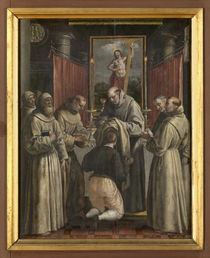The Catholic Defender: Saint John Eudes a Doctor of the Church
- Donald Hartley

- Aug 18
- 3 min read
Updated: Aug 19
Deepertruth with special permission and aid with Franiciscan Media, a great team for the Lord

St. John Eudes was a French missionary and the founder of the Congregation of Our Lady of Charity, and was also the author of the liturgical worship of the Sacred Hearts of Jesus and Mary.
Saint John was deemed as the patron saint of love, loyalty, friendships and authors. He and Peter were the only two apostles sent by Jesus to prepare the final Passover meal which was the last meal for Jesus.
John Eudes is probably best known for the central theme of his writings: Jesus as the source of holiness; Mary as the model of the Christian life. His devotion to the Sacred Heart and to the Immaculate Heart led Pope Pius XI to declare him the father of the liturgical cult of the Hearts of Jesus and Mary.
How little we know where God’s grace will lead. Born on a farm in northern France, John died at 78 in the next “county” or department. In that time, he was a religious, a parish missionary, founder of two religious communities, and a great promoter of the devotion to the Sacred Heart of Jesus and the Immaculate Heart of Mary.
John joined the religious community of the Oratorians and was ordained a priest at 24. During severe plagues in 1627 and 1631, he volunteered to care for the stricken in his own diocese. Lest he infect his fellow religious, during the plague he lived in a huge cask in the middle of a field.
St. John Eudes captured the devotion to the Sacred Heart of Jesus and the Immaculate Heart of Mary by honoring them in the liturgy. Thanks to this saint, Holy Cross priests have as their patron Jesus' Sacred Heart, and Notre Dame has a Basilica dedicated to the Sacred Hearts of Jesus and Mary.
At age 32, John became a parish missionary. His gifts as a preacher and confessor won him great popularity. He preached over 100 parish missions, some lasting from several weeks to several months.
In his concern with the spiritual improvement of the clergy, John realized that the greatest need was for seminaries. He had permission from his general superior, the bishop, and even Cardinal Richelieu to begin this work, but the succeeding general superior disapproved. After prayer and counsel, John decided it was best to leave the religious community.
That same year John founded a new community, ultimately called the Eudists—the Congregation of Jesus and Mary–devoted to the formation of the clergy by conducting diocesan seminaries. The new venture, while approved by individual bishops, met with immediate opposition, especially from Jansenists and some of his former associates. John founded several seminaries in Normandy, but was unable to get approval from Rome—partly, it was said, because he did not use the most tactful approach.
In his parish mission work, John was disturbed by the sad condition of prostitutes who sought to escape their miserable life. Temporary shelters were found, but arrangements were not satisfactory. A certain Madeleine Lamy, who had cared for several of the women, one day said to him, “Where are you off to now? To some church, I suppose, where you’ll gaze at the images and think yourself pious. And all the time what is really wanted of you is a decent house for these poor creatures.” The words, and the laughter of those present, struck deeply within him. The result was another new religious community, called the Sisters of Charity of the Refuge.
John Eudes is probably best known for the central theme of his writings: Jesus as the source of holiness; Mary as the model of the Christian life.
His devotion to the Sacred Heart and to the Immaculate Heart led Pope Pius XI to declare him the father of the liturgical cult of the Hearts of Jesus and Mary.
Eudes was canonized as a saint in mid-1925 and his supporters are now petitioning to have him named a Doctor of the Church
O my God, if in the past I have turned aside from You who are my Beginning, my End, and my supreme good; if I have turned toward myself and creatures, preferring their will and mine to Yours, I here and now promise to renounce, entirely and forever the world and myself, and to give myself wholly and forever to You.





















Comments